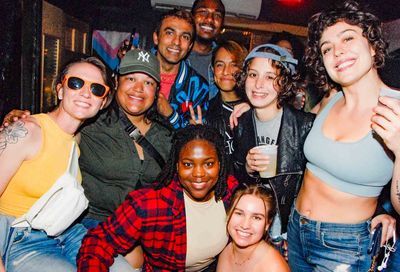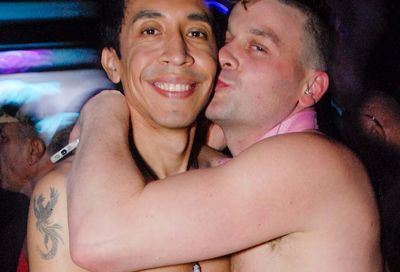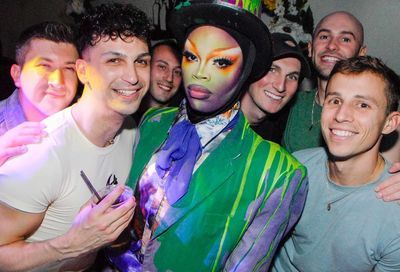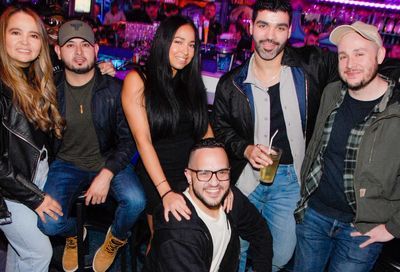The Task at Hand
Matt Foreman on the future of the National Gay and Lesbian Task Force and the progressive fight for LGBT civil rights
When the crowds gather next Thursday, April 7 for the National Gay and Lesbian Task Force’s 16th Annual Leadership Awards to honor former presidential candidate and current Democratic National Committee chair Howard Dean, the event should be about more than the glitz of a Washington gala.
“There is power in events that goes far beyond the money they raise,” says Matt Foreman, the 50-year-old executive director of the Task Force. “The people who support the Task Force support us through thick and thin. They support the really unglamorous work that we do at the grass roots. And they love the organization. That really comes through at our events. And that’s what gets me excited.”
Foreman came to the Task Force two years ago after spending years in activism in New York state, particularly with the Empire State Pride Agenda, where he had served since 1997 as executive director. Before that, he was known for his work at the helm of the New York City Gay and Lesbian Anti-Violence Project. He also spent 10 years in state government, working in prison policy and administration in West Virginia and New York.
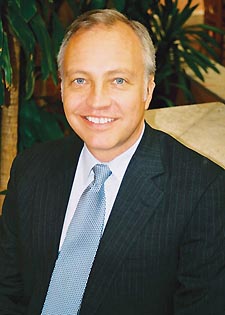 Foreman |
Since arriving at the Task Force, he’s steered the organization onto a politically prominent course, particularly around the development and growth of grass roots LGBT organizations at the state and local levels. And he believes there’s much work to be done in a political climate that’s moving to turn back gains in gay and lesbian civil rights.
“I think that Nov. 2 was a real wake-up call for a lot of gay people across the country,” Foreman says. “There has been for many years a significant portion of our community that has bought into the notion that this was going to be a steady march towards equality and that we’re just going to have minor hiccups along the way.
“[The election] demonstrated that we have a very, very long way to go to build the kind of political strength that we need to start winning on a scale that we need to win on… and to get allies in the progressive movement to stand beside us.”
METRO WEEKLY: First off, why is the Task Force honoring DNC chair Howard Dean at this weekend’s leadership awards?
MATT FOREMAN: We traditionally honor allies who have done work not only for the LGBT community but have advanced progressive ideals. We’re honoring Dr. Dean for his lifetime of work on progressive issues, including LGBT issues, but also work on health care, education and the environment. He has a really outstanding record on a whole range of issues that we think are important.
MW: What do you think his impact will be now that he has moved into the DNC chair? How do you think it will impact the gay rights movement, particularly after the past election cycle?
FOREMAN: Well, our Lifetime Achievement Award is going to Dr. Dean for everything he has accomplished to this point. It has nothing to do with his recent election to the DNC chair — I want to be very clear about that. I think that Dr. Dean campaigned for the DNC chair position by saying that we should make sure that the Democratic Party stays true to its roots and does not move any further to the right. I think that it’s going to be very interesting to watch that tension in the party, which you can already see happening with people who are making overtures to the anti-abortion movement or to faith-based initiatives. There is going to be real tension over these next four years about the core values of the party.
MW: The Democratic Leadership Council wing versus the progressive wing?
FOREMAN: I think it’s broader and deeper than that. I think it’s because the Democrats did not get the White House that there is an intense amount of soul searching and debate going on about the best way to win again. Is it to go after and shore up your core constituency? Which is something we believe in. Or is it trying to reach this illusory middle swing vote? There are enormous forces pulling in both directions. I think it’s going to be a very challenging time for Dr. Dean and a fascinating time to see what’s going to happen to the Democratic Party.
MW: You talk about Dean’s record as a whole. How big of a figure is he going to be in the history of the gay and lesbian movement’s straight allies?
FOREMAN: He will always be remembered as the first governor to sign a civil unions bill. It’s remarkable to think that five years ago civil unions caused a virtual civil war in Vermont. Now civil unions are almost a fallback position that even President Bush can support. He will always be remembered for signing that bill. That took a tremendous amount of courage and the consequences for people who supported civil unions in Vermont, including Dr. Dean, were severe. When elected officials risk their jobs for an issue or for a principle, that’s a pretty extraordinary thing.
MW: Looking at the tensions in the Democratic Party you mentioned, Hillary Clinton has made some verbal overtures to the pro-life side of the abortion debate. How is that tension playing out on gay and lesbian issues? Do you feel that there is a part of the Democratic party that will move away from gay issues?
FOREMAN: Immediately after the election, it was Democrats that put out the false myth that gay marriage cost Kerry the election. And there is still that sentiment out there even though it is not supported by one shred of evidence. There are forces in the party that still believe that and believe that the way in which they are going to regain power is to distance themselves from issues like choice, marriage equality, affirmative action.
I think that the way the Democratic Party is going to become the majority party is by doing what the Republican Party has done very well over the last 20 years: cultivate and take care of their base. That is something the Democrats have not done a good job of for a while. There’s just no way for the Democrats to cobble together a winning majority if it loses significant support in the gay community, the women’s community, the African-American community, and the Jewish community. We are the four key constituencies of the Democratic party.
MW: Would you say that gay marriage in the last election cycle was more of a play from Republicans for their base, not something that swung the middle-ground voters but increased the turnout of their base voters?
FOREMAN: There’s this mythical middle where people are fighting over this very small sliver of the vote. One of the things that the Republicans have done very well is energize their base, so you have evangelicals and social conservatives almost fanatic in their level of support. And the progressive side in 2004 did start with MoveOn.org and others to focus on rebuilding grass roots. Everywhere that that was done it really paid off.
Democrats are playing catch-up, but I think those kinds of efforts demonstrated that if you focus on constituencies you can significantly increase turn out. It is much easier, more economical and more effective to turn out your base than to try to convert people over to your side. That’s Politics 101.
MW: The Terry Schiavo case has featured a lot of argumentation within the Republican coalition, in some ways along the well-known split between social and Christian conservatives and the more traditional financial conservatives. Some people are predicting a Republican crackup, while others are dismissing the possibility. What do you think?
FOREMAN: There is that potential, but one very chilling but very admirable quality of our opponents is their ability to set aside some very profound differences to focus on a few key priorities. While I think they do have serious disagreements over many things, I don’t think that’s going to result in any fracturing of the alliances that they built. They have coalesced around a few key issues and they are making tremendous progress in those areas — like choice, attacking gay people, the war in Iraq, and dismantling government. They are making tremendous progress there and they are not going to risk all of that, I don’t believe, by fracturing over some of these contentious issues.
MW: Looking at Congress as a hostile territory for gay issues with its current leadership, particularly in the House, do you think there’s a tendency for them to over-reach at this point?
FOREMAN: I am consistently amazed at how far the current leadership is willing to over-reach and how much they get away with. I’ve been expecting a public backlash against the extreme measures of the Congress for some time now, but it hasn’t happened. I’m very leery of predicting when this tipping point is going to come. I believe it has to come, that at a certain point a wide swath of the population is going to open their eyes and see what an extreme direction Congress has taken this country over the past four years. Just what’s happened in the last few weeks, whether you look at the Schiavo fiasco, the bankruptcy bill, or drilling in Alaska. A lot of this is simply breathtaking and they show no signs of relenting. They seem drunk with power at the moment.
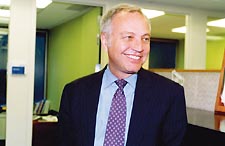 |
MW: Given the safety of incumbency and the entrenchment of political parties, is there a way to significantly move these institutions to where you can move LGBT issues?
FOREMAN: I think that people in the LGBT community always need to recognize the extraordinary, unprecedented progress that our community has made. I can’t think of another social justice movement in history that has made so much progress within such a short period of time. We are in very tough times right now and we’re going to be in tough times for another four or five, even 10 years. We just have to put our shoulders to the wheel and keep pushing because it’s not always going to be like this. The country is going to come back to a saner and more just way of looking at the world. We have to use this period now to just keep chipping away, keep educating people, keep advocating so that when the pendulum swings back, we’re ready to take advantage of that moment.
The only question in my mind is are we going to win equal rights under the law in my lifetime? Or is it going to take another 30 years? So it’s not a question of “if,” it’s a question of “when.” And even if takes another 30 years, although that’s going to be another three decades of injustice and pain suffered by our people, it’s still a very short period of time when you look at the struggles [of other] communities.
MW: We have two well-known major organizations in the gay and lesbian community that work on political issues: the Task Force and the Human Rights Campaign. Do you see the Task Force as the organization that’s pursuing a progressive agenda? How do you see the Task Force’s work relating to HRC’s?
FOREMAN: We’re into our thirty-third year now, and since our founding we’ve always seen our role in the movement as pushing the envelope as far as we can. I think that’s what we need in the movement. We need organizations that are creating space for other organizations to move more quickly. I think a fairly good analogy is when ACT UP played this essential role in the AIDS epidemic, creating space for researchers, academics and mainstream service organizations to come in and negotiate with the government. If we had not had ACT UP out there, the advances that were made in fast-tracking HIV/AIDS drugs, the Ryan White CARE Act, you name it, would not have occurred or would have taken much longer. So I see HRC and the Task Force’s role as very complementary, not competitive. One thing I love about being at the Task Force is that our donor base understands what our role is and they support me and our staff in taking very hard-line positions because they know that every social justice movement needs those kinds of voices.
MW: It seems like over the years that the Task Force has moved more of its focus to grassroots and state-level organizing. Do you consider the Task Force to be a D.C.-focused organization or a state-network-building organization?
FOREMAN: Our mission is to build the grassroots political strength of our community, so the work that we do in Washington is about building grassroots political strength. That’s why we’re really focusing on getting money flowing back into our community centers, our health clinics, anti-violence programs, youth programs. We know that one, our people need the services. Two, our community is grossly underserved and cheated out of its tax dollars. But three, and most important to us, is that we know that federal and state dollars flowing into our institutions builds grassroots political strength. They stabilize and professionalize our organizations, they enable an incredible amount of political organizing and political strength to come out of them. So, yes, everything we’re about is how do we build up local power.
MW: The Task Force recently sponsored the Winter Party down in Miami. Did you raise money off of that?
FOREMAN: I think it was a great success. I was nervous about it because we’ve never undertaken an event that large. We haven’t finished all the accounting for it but we made around $200,000 — I’m not sure yet [of the total]. There’s a lot of accounting that goes on, but I was incredibly proud of the entire week. I was especially proud that we were able to add seven cultural events and truly make this into a festival. We’re going to keep on adding those kinds of events as the years go forward so that it really draws every part of our community.
MW: Given that the party started as a circuit party, and the reputation for drug use among elements of the circuit, what were the talks like at the Task Force when it decided to sign on to the event? I know there was a lot of talk before the Winter Party about no tolerance for drugs at the event.
FOREMAN: I have a funny story to tell about that. We absolutely did not want to see drugs, we didn’t want people using drugs, we didn’t want anyone with a drug-related problem at our event. I was walking up and down the dance floor at the beach party and I walked by a couple dancing. They were about my age. And one guy’s eyes kind of went the back in his head and he started to fall backwards and he had this awful look on his face. And I thought, “Uh oh, here we go.” The guy dancing with him brought him over to the side and I said, “Are you okay? Should I get the medics?” And the guy said, “No, I’ll be okay, I just threw my back out.” That was my classic moment. I guess that says a lot about where we are right now.
We took the [Winter Party proposal] to our board and we had a long discussion about potential drug use at events. We don’t believe that doing away with these events is somehow going to diminish drug use in the community. We feel strongly that you can set community norms at these events. We think that we can educate people about safe sex and the dangers of crystal. We weren’t born gay just to do politics and rallies — we were born gay to have fun. I had never been to a Winter Party before, but this year was a joyous and fun and affirming event.
MW: Were there any problems with drugs at the event — were the medics used for anything?
FOREMAN: We had a couple of people who were drunk and that was about the extent of it. We didn’t have to have any ambulance runs. When you think that we had over 4,500 people there, that’s a pretty good record. That may not happen every year because substance abuse in our community, and other communities, is a real problem. But we didn’t have any problems this year and I’m grateful for that.
MW: Outing as a political tactic is in the news again. How do you feel about outing — is it something that should or should not be used?
FOREMAN: The Task Force does not do outings, but I think there’s a consensus in the organization that outing is appropriate when gay people vote to deprive us of our human rights. I’m talking about people who have the power to do something. I’m not sure that it extends to staffers or secretaries. I think it’s appropriate for people who are in a position to either vote on legislation or make and enforce policy.
MW: How hard is it to determine who has power when some congressional staffers wield a considerable amount of power in legislation and policy? Isn’t it hard to make outing determinations based on “power”?
FOREMAN: We don’t do outings, so we don’t have to worry about it. I think it is hard to make those determinations and I’m cognizant, having worked inside government, that it is possible to make a lot of change from the inside. It would be hard to know if a staffer for a homophobic member of Congress was really trying very hard to bring that member around or ameliorate some of the worst parts of what that member was doing toward our community. That’s a very difficult call and I’m glad we don’t have to make it.
MW: You’ve got Log Cabin Republicans, who take a lot of heat from parts of the community. How important is it to you to have organizations such as Log Cabin trying to work with Republicans?
FOREMAN: We will never be able to move a quality agenda forward on the back of one party. It’s a mistake to think that we can. And I value Log Cabin very much and I appreciate what they’re doing. The Task Force disagrees with some of their positions on such things as Social Security, taxation, welfare reform, etc. But they are allies and we are going to make progress only when we are able to bring more Republicans over to our side. I have had a lot of experience working with Republicans in New York and I can say that it pays off.
MW: You said earlier that gay and lesbian equality was not a matter of “if” but “when.” When did know that equality would definitely be achieved at some point?
FOREMAN: I think Stonewall 25 and the million people who came to New York City in 1994 [for that march]. It felt that there was never going to be a turning back from that. It wasn’t so much a political moment as it was a personal moment, that there’s no turning back now. You can never turn back this many people.
The 16th Annual Task Force Leadership Awards, honoring Howard Dean, will take place on Thursday, April 7, at the Omni Shoreham Hotel in Washington, D.C. The VIP Reception begins at 6:30 p.m., the general reception at 7 p.m. and the program at 8 p.m. Tickets are $250 (VIP), $150 (general) and $60 (student). For more info, visit www.thetaskforce.org/awards.
Support Metro Weekly’s Journalism
These are challenging times for news organizations. And yet it’s crucial we stay active and provide vital resources and information to both our local readers and the world. So won’t you please take a moment and consider supporting Metro Weekly with a membership? For as little as $5 a month, you can help ensure Metro Weekly magazine and MetroWeekly.com remain free, viable resources as we provide the best, most diverse, culturally-resonant LGBTQ coverage in both the D.C. region and around the world. Memberships come with exclusive perks and discounts, your own personal digital delivery of each week’s magazine (and an archive), access to our Member's Lounge when it launches this fall, and exclusive members-only items like Metro Weekly Membership Mugs and Tote Bags! Check out all our membership levels here and please join us today!























